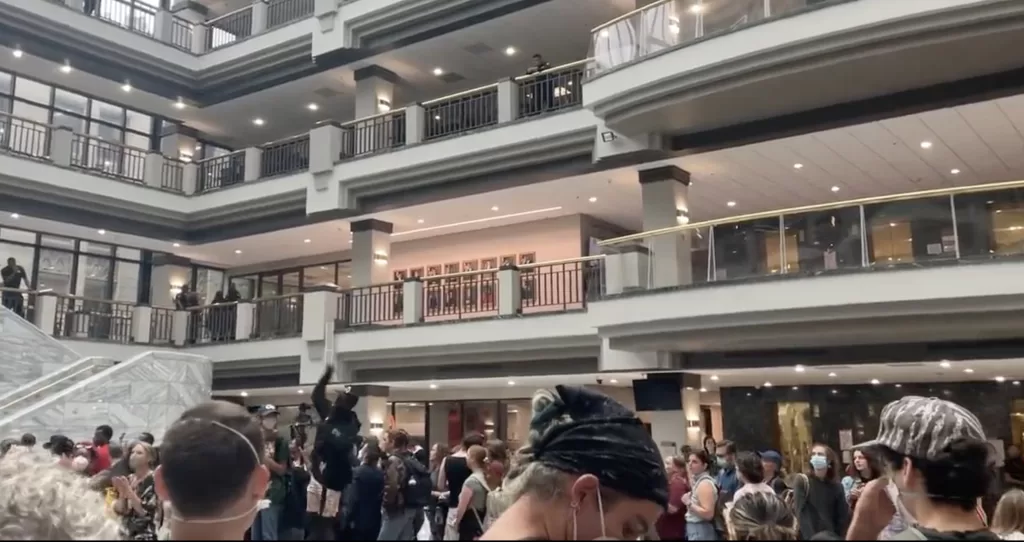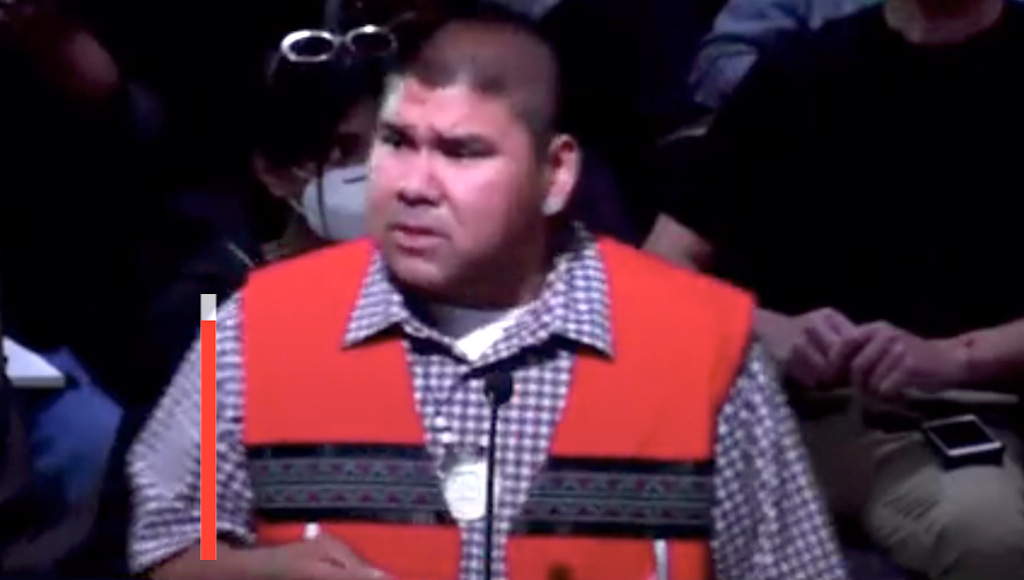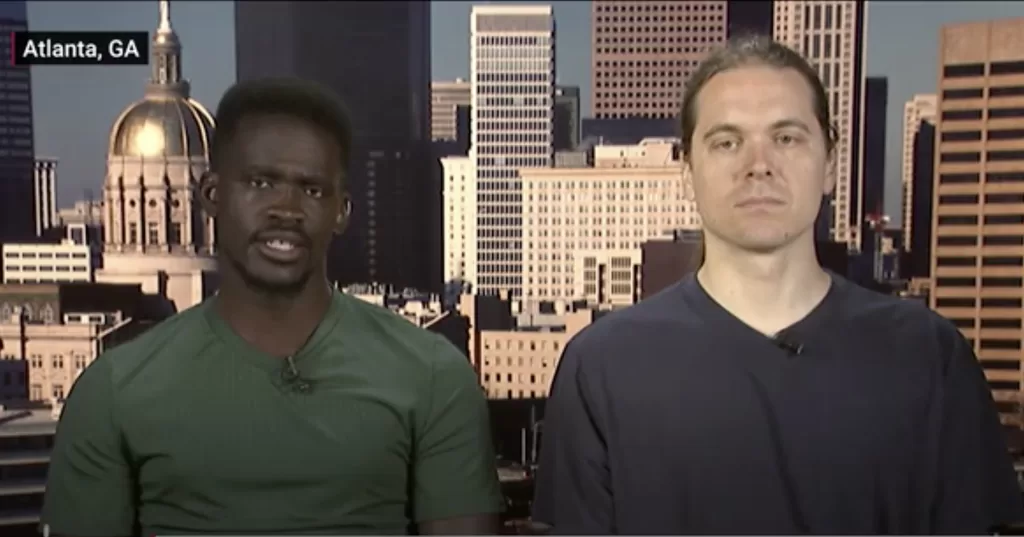
Editor’s Note: Below is a transcript of a Democracy Now! report from Atlanta, Georgia, where thousands of residents lined up at an Atlanta City Council meeting to voice their opposition to the construction of a massive police training facility known as Cop City. See original story at https://www.democracynow.org/2023/6/6/cop_city_atlanta_vote_bail_fund
AMY GOODMAN: We begin today’s show in Atlanta, Georgia, where residents shattered the record for turnout at a city council meeting Monday, as thousands lined up to voice their opposition to the construction of a massive police training facility known as Cop City.
PROTESTERS: Let us in! Let us in! Let us in! Let us in! Let us in! Let us in!
AMY GOODMAN: Atlanta police enforced enhanced security as people signed up to participate in a public comment session ahead of a vote to approve $30 million in additional funding for Cop City, bringing the total to $67 million — more than double the original estimate. It would be the largest police training facility in the country.
This comes after an Atlanta police SWAT team, guns drawn, raided the Atlanta Solidarity Fund last Wednesday and arrested three people who had been raising money to bail out protesters opposed to Cop City, charging them with money laundering and charity fraud.
Georgia Democratic Senator Reverend Raphael Warnock criticized the arrests in a statement Sunday, saying, quote, “While we still don’t have all the details, as a pastor who has long been engaged in justice work, I am concerned by what we know about last Wednesday’s show of force against the organizers of an Atlanta bail fund, and the questions it raises,” he said.
Those arrests come as 42 protesters face charges including domestic terrorism for opposing Cop City, and after Atlanta police shot dead the environmental activist Manuel “Tortuguita” Terán in January. An autopsy shows they were sitting with their hands raised up in front of their body when police shot them 57 times.
Muscogee Indigenous leader Mekko Chebon addresses the Atlanta City Council:

MEKKO CHEBON: I am a part of the Methodist structure. I have been a part of the United Nations Permanent Forum on Indigenous Issues. I have been with conversations of human rights all across the world. I have walked with refugee camps in other parts, in other nations of Indigenous peoples. I’ve seen situations just like what we’re going through here in other countries. I’ve seen things going on where people have been killed, just like what we’re trying to say should never happen here, all over the world. And I don’t want that to increase.
Every time in these countries, I shared with them, no matter what, how you slice it, the increasing of more militarized mechanism never establishes a peaceful society, no matter what. It never accomplishes what your hopes, what your arguments are. In fact, it does quite the opposite. In fact, our community, we are already living through the living proof of that at this moment. Today, I think it’s obvious. I don’t support Cop City.
AMY GOODMAN: Monday’s Atlanta City Council meeting started in the afternoon and continued for nearly 15 hours, until about 5 a.m. this morning. At one point, protesters broke out in song as public comment continued. Ultimately, at about 5:30 this morning, the Atlanta City Council voted 11 to 4 to fund the Cop City facility.
For more, we go to Atlanta for an update. Marlon Kautz is with us, an organizer with the Atlanta Solidarity Fund, who was one of the three people arrested last Wednesday and just spent four days in jail. Also with us, one of the first to speak during Monday’s public comment session, Reverend James Woodall. He’s a public policy associate at the Southern Center for Human Rights and co-author of Wired for Racism? How Evolution and Faith [Move Us to] Challenge Racial Idolatry.
Reverend Woodall, let’s begin with you. When you arrived at the Atlanta City Hall to give your public comment, can you talk about the different level of security and protocol to enter the premises that you had ever experienced before?

REV. JAMES WOODALL: Most definitely. Well, first, let me start by saying thank you for having us on the show today.
And when we entered Atlanta’s City Hall, we were met with bomb dogs. We were met with officers donning AR-15s. We had folks in riot gear. We saw a heightened level of security both in protocol — meaning when we entered into the City Hall, we couldn’t even bring in food or water. And people were planning to be there literally all day and all night. And to not even be able to bring in Gatorade — I had to throw my Gatorade out and had to walk out of the City Hall, throw it out and then come back in. And, you know, it took a miracle, essentially, to be able to even bring pizza in towards the latter portions of the afternoon into the evening.
And we saw law enforcement officers really on every single level of the City Hall in the inside of the atrium. And so, I had never seen that kind of activity in which our law enforcement response would essentially, you know, criminalize in some ways what we were trying to do, which was to lift up the voice of the people.
JUAN GONZÁLEZ: And, Reverend, I wanted to ask you — the mayor of Atlanta has claimed that much of the opposition is from outside agitators and a white movement. Could you talk about your own history in Atlanta and why you got involved in this movement?
REV. JAMES WOODALL: Oh, for sure. I’m a sixth-generation Atlantan. In fact, my grandmother’s granddad, his dad purchased property in the heart of the West End of Atlanta off of Finley Avenue for essentially $83 without a mortgage. And so, our family has been in the heart of Atlanta for almost a century. And I’m talking before the Emancipation Proclamation. And several dozens and hundreds of other people, in fact, almost every single person that we saw and heard from last night and yesterday afternoon, was from Atlanta.
Now, granted, there are people who are not from Atlanta, as well, but who cares? Because at the end of the day, what we’re fighting for is liberty and justice for all, which they pledged their allegiance to, for the flag of this yet to be United States. And so, if there is injustice anywhere, there is a threat to justice everywhere. And unfortunately, again, democracy has failed us, because that is just simply not the case. And so, when I think about what the mayor said — in fact, I’ll even tell you, is that the mayor’s mother taught my grandmother how to do hair, which taught my mom how to do hair.
And so, when I think about how I got involved in this work, and I’m seeing what’s happening on the ground each and every day inside of our facilities, I’m seeing, you know, children and college students pulled out of cars and being tagged — and laser — I mean, not laser tagged, but, essentially, targeted for being at the wrong place at the wrong time. I’m seeing people die, literally die, at the hands of law enforcement, both here in the city of Atlanta and surrounding these counties, in these communities, because this is not just about the city of Atlanta. We’re going to see departments and agencies all over this nation send its people, send its law enforcement and first responders here to train on urban warfare. And what we saw last Wednesday, what we’ve seen over the course of the last few months as relates to domestic terrorism charges is concerning and is exactly the kind of reason why we stand in complete opposition to this project.
JUAN GONZÁLEZ: And this was a marathon meeting of the Atlanta City Council. Your response to the outcome and the vote? And did you get a sense that any members of the City Council were moved at all by the testimony?
REV. JAMES WOODALL: Well, what I’ll tell you is that that is an example and is indicative that our democracy has died. And the spirit of democracy has died, because when the people show up, and you see both parties — this isn’t a red-versus-blue, Democrat-versus-Republican kind of issue. We saw Republicans come out in opposition. We saw libertarians come out in opposition. You saw Democrats come out in opposition. You saw people who are not affiliated with any of the above come out in opposition. And when you see elected officials choose the side not of the people — right? — not of justice and liberty for all, but when you see elected officials take the side of corporate executives and nonprofit leaders who seek to profit off of taxpayer dollars — right? — what we should be talking about is charity fraud on behalf of the Atlanta Police Foundation because what we’ve seen them do and how the numbers have just not added up. And so, I’m concerned that our democracy is dead, because our elected officials are not representing the people, regardless of who they vote for.
AMY GOODMAN: I wanted to bring in Marlon Kautz into the conversation with Reverend James Woodall. Marlon is with the Atlanta Solidarity Fund, one of the three people arrested on Wednesday. This was just days before this critical Atlanta City Council vote, where they voted to approve what’s now more than double the amount originally proposed for this police facility. Marlon, if you can talk about, I mean, how unusual the level of force used was in this raid on the Atlanta fund, which not only has helped people who have been arrested around the Cop City, but you do this for many people who have been arrested?
MARLON KAUTZ: Absolutely. In terms of the raid, it was terrifying, obviously. And you’ll have to forgive my voice. I’m still feeling the effects of the better half of a week in DeKalb County Jail. But, you know, we woke up to the sound of our door being broken down by a battering ram and our house being surrounded by dozens of SWAT officers. And my first reaction was that this has to be a mistake. You know, naively, I thought this wasn’t the kind of thing that could happen to organizers like us. But once I saw the automatic weapons, the body armor, and I heard police discussing throwing a flashbang into our living room, I realized that these police had come prepared to kill us, in the same way that police have come prepared to kill activists protesting in the forest — and, in fact, did kill Manuel “Tortuguita” Terán. And so we quickly surrendered. We were arrested in our pajamas and taken to jail.
So, the experience was terrifying on two different levels: in this immediate way of what it was like to face that kind of police violence for doing nothing more than nonviolent work to support the rights of protesters, but also on this higher level of what it means, right? Because if this kind of police violence can be brought even against organizers like us, who — you know, who do nothing more than make sure that activists have access to lawyers, who make sure that they’re able to make bail if they can’t afford it themselves — if this kind of violence can be brought against people like us, who is safe in this city? And what does that mean for the right to protest and democracy?
JUAN GONZÁLEZ: And, Marlon, what happened at your bail hearing on Friday? What was the judge’s response to your arrest and the charges against the three of you?
MARLON KAUTZ: I mean, after days in jail, we finally got in front of a judge, who confronted the allegations against us, the arrest warrants. And the judge very quickly acknowledged that the charges are baseless, they’re nonsensical. We were being charged with charities fraud and money laundering. And the activities of our organization are completely legal. They’re transparent. They’re aboveboard. We very carefully follow all laws and regulations related to our work, because we know that we are in the crosshairs of many political forces. And the judge recognized this and, fortunately, issued us bail, which has been unusual in these protest cases, which are usually denied bail flat out.
And I think this shows that the effort of prosecutors to demonize organizers associated with the movement against Cop City are beginning to be exposed. They’re beginning to become unraveled and shown to be what they are, which is malicious political prosecutions that have nothing to do with enforcing the law, keeping the public safe. What they really have to do with is bringing the force and violence of police and prosecutors to suppress a political movement, to suppress political speech.
AMY GOODMAN: I wanted to ask Reverend James Woodall — you’re deeply concerned about issues of police brutality and abuse of power. This is a police training facility. Now you have Senator Warnock also weighing in, deeply concerned about the raid on the Atlanta Solidarity Fund, with weapons drawn, by a SWAT team. But if you can comment on why you are concerned about a police training facility? Isn’t that what you would want, police to be trained better?
REV. JAMES WOODALL: It’s exactly what I don’t want, because when we think about police training, we’re not talking about police training. We’re talking about an infrastructure project. We have yet to talk about what they’re being trained to do. In fact, if you were to look at — and I’ve been in this work a long time. And every time we talk about police training, we’re talking about a furthering urban militarization of law departments or law enforcement officers. We’re not talking about deescalation. We’re not talking about ensuring that there is equitable accountability for law enforcement officers who disregard the training that they were already invoked in the earlier parts of their career and continuing in their professional development. We’re not talking about the fact that every single officer in cases of police brutality and police-involved death in the last 10, 12 years — and that’s just a small segment of the history — but we’re not talking about the fact that they have been trained, and they’ve been trained very thoroughly, and yet these people still are dying.
And so, what we were organizing around in 2020, what we’ve organized around after the murder of Breonna Taylor, George Floyd, Ahmaud Arbery, after the deaths of Atatiana Jefferson and so many others — I can go down the list — what we were calling for was accountability and true justice. And this $90 million that people are saying is necessary for us to have better policing, really, is an insult, because what we’re not saying is that we want to build a system of public safety that’s inclusive of all of us, not just law enforcement, because that is a political football that people can throw so that they can win elections. This is what that is about.
We have an attorney general in Chris Carr who led that raid on Atlanta Solidarity Fund, who’s trying to posture himself to run for governor. He have a governor in Brian Kemp who signed off and endorsed that action, as he tries to promote someone running for president and himself possibly for the United States Senate. We have Senators Warnock and Ossoff, who also weighed in only after a lot of immense pressure on behalf of organizers who were pissed off that they refused to say anything at all.
And so, what we have right now is not about training, is not about public safety and has everything to do with a political aristocracy that refuses to acknowledge the pain and the reality of everyday life for everyday Georgians and everyday Americans. That is not democracy. That is not leadership. And that is totally not public safety.
AMY GOODMAN: Reverend James Woodall, I want to thank you for being with us, public policy associate at Southern Center for Human Rights, co-author of Wired for Racism? How Evolution and Faith [Move Us to] Challenge Racial Idolatry. And Marlon Kautz, thanks so much for joining us, of the Atlanta Solidarity Fund, one of three members of the bail fund arrested last week during an armed police SWAT team raid, spent four days in jail.
The original content of this program is licensed under a Creative Commons Attribution-Noncommercial-No Derivative Works 3.0 United States License. Please attribute legal copies of this work to democracynow.org. Some of the work(s) that this program incorporates, however, may be separately licensed. For further information or additional permissions, contact us.
